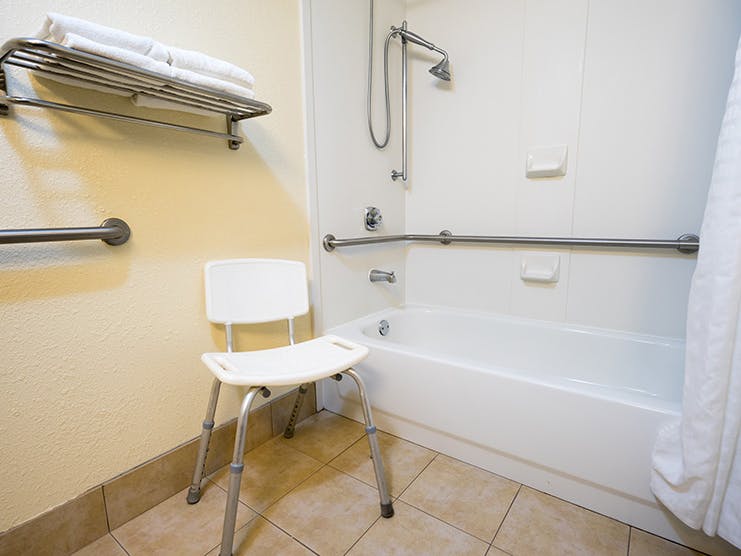
Shower chairs and grab bars help keep you safe in the shower or bath.
As we age, we may need to make some home modifications in order to age in place, or remain in our homes and live safely, independently, and comfortably. Examples include installing ramps, safer flooring, or handrails; making your kitchen more accessible; and improving lighting. And, of course, you may wish to implement safety improvements in the bathroom, such as a shower chair or grab bars.
Shower chairs can help you prevent injury if you have mobility or balance issues, giving you the support you need to keep you safer while showering. Read on to learn more about Medicare coverage for shower chairs and other safety devices, as well as durable medical equipment (DME) coverage.
Types of shower chairs and uses
Shower chairs may also be called bath chairs, shower seats, shower stools, or shower benches, depending on where you buy them from. However, they all serve essentially the same purpose – providing someone with support while in the bath or shower to help prevent falls and injury.
Shower chairs are typically made of plastic or coated metal and designed to be water-safe while minimizing slippage on wet surfaces. There are several different styles, including:
- Chairs with backrests, designed for those who need back support while showering
- Chairs with arm support, which give a place to grip and hold while sitting and standing
- Chairs with wheels for those with special mobility needs, though these can be more dangerous on wet surfaces
- Chairs without backrests or arms, which allows for easy repositioning and is best for those who prefer a full range of motion
Your doctor can help you determine which type of shower chair may work best for your needs.
Shower chairs don’t have to be expensive, but the cost can vary depending on the model. Some cost as low as $20, while others can range up to $300 or more.
Medicare durable medical equipment coverage
Shower chairs are not considered durable medical equipment, which is covered by Part B. DME is defined as:
- Durable, with an expected lifetime of at least three years
- Used for a medical reason
- Not usually useful to someone who is not sick or injured
- Used in your home
If your doctor prescribes the DME for use in your home, it may be covered. After meeting the Part B deductible, you’d pay 20% of the Medicare-approved amount if your supplier accepts assignment. Medicare pays the other 80%. Depending on the type of equipment, you may need to rent it, buy it, or choose whether to rent or buy.
Medicare coverage for bathroom safety equipment
Staying safe and independent in the bathroom is important, which is why many beneficiaries look to purchase and/or install bathroom safety equipment. In some cases, your doctor may even recommend it to reduce your risk of falling and increase your independence. However, Medicare does not typically cover bathroom equipment. Here are a few of the most common safety needs and their Medicare coverage.
Shower chairs
Medicare Part B covers durable medical equipment that’s considered medically necessary and prescribed by a doctor. Shower chairs are not included in this coverage, so if you think a shower chair could be helpful for you, you’ll have to pay for the full cost out-of-pocket.
The exception is if you need a shower chair during an inpatient stay in a hospital or skilled nursing facility (SNF). In that case, Medicare Part A may help cover the cost of services and supplies you receive while admitted, including the chair.
Bathroom modifications
Bathroom modifications such as widening the doorway, installing a walk-in bathtub or shower, or modifying flooring are not covered by Medicare. If you need bathroom modifications, you’ll have to pay that cost out-of-pocket.
The exception is that Medicare may give partial reimbursement for the cost of a walk-in tub if your doctor considers it medically necessary. While approval is not likely, you should still send in any and all documentation, your doctor’s prescription for the tub, your receipts, and doctor-signed forms listing reasons as to why the item is mandatory for you.
Be sure to do research on your options and alternatives. For example, instead of replacing the bathtub or shower, you may be able to purchase a bathtub transfer bench for a much lower cost.
Grab bars
Typically, grab bars are not covered by Medicare. These will likely cost between $75 and $200 to purchase and install.
Raised toilet seats
Raised toilet seats, or commode chairs, are considered a convenience item, so they are not covered by Medicare. However, these supplies are not typically expensive to purchase.
Do Medicare Advantage plans cover shower chairs?
Medicare Advantage plans (Part C) are offered by private insurance companies and cover at least everything Original Medicare (Part A and Part B) does. However, most provides additional benefits as well, such as Part D prescription drug coverage, hearing, dental, vision, and more.
Some MA plans may offer over-the-counter allowances that cover some items, such as a shower chair, but you should check with the individual plan to understand exact coverage and costs. Your MA plan may also cover or offer allowances for other bathroom safety equipment like grab bars, raised toilet seats, or others.
Additional Resources
Durable Medical Equipment Coverage
External Website Link
16 Tips for Aging in Place
Internal Website Link
What Equipment Does Medicare Pay For?
Internal Website Link



